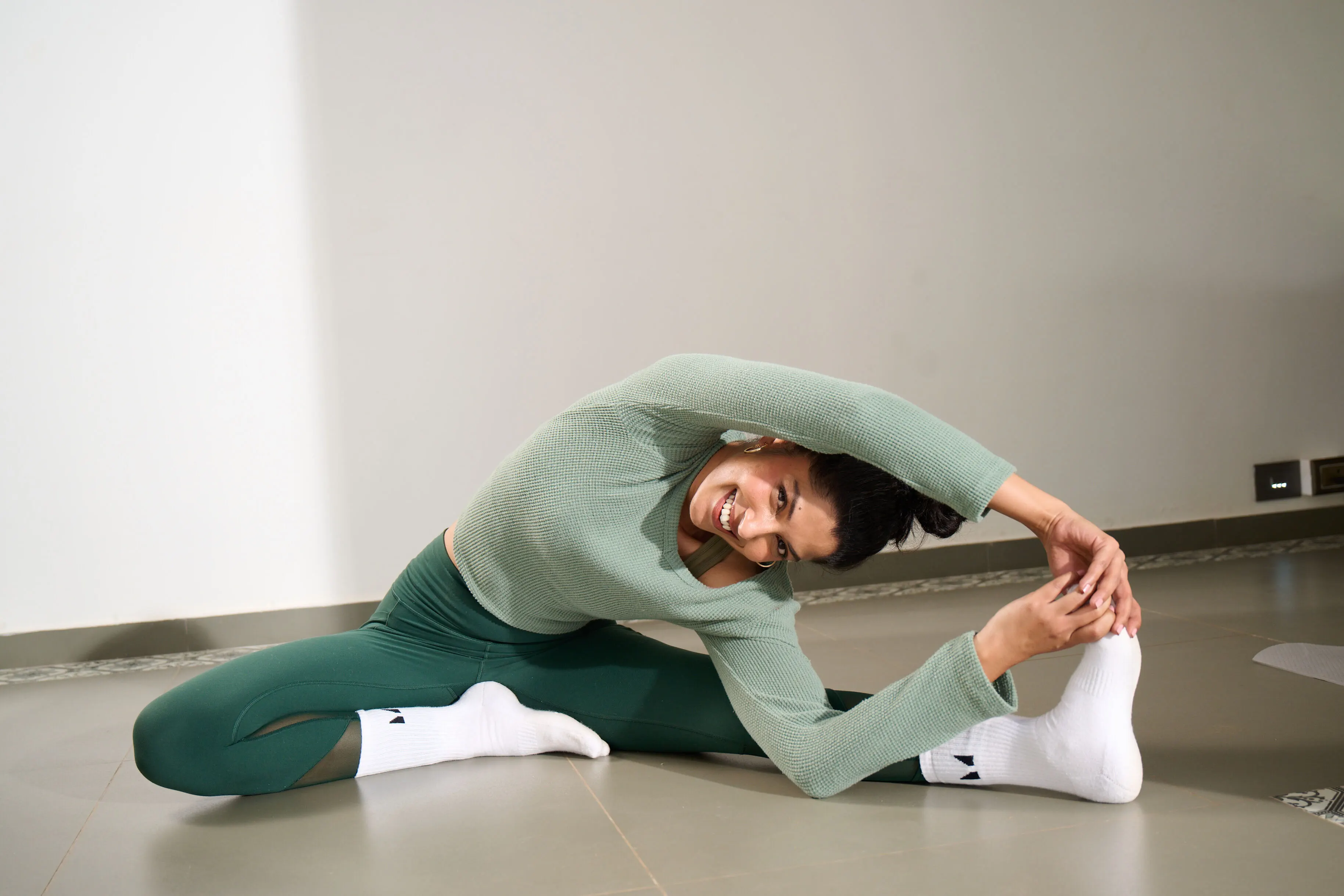Staying hydrated is a fundamental aspect of maintaining good health, and it becomes even more crucial when engaging in physical activities like Yoga. Hydration plays a key role in supporting your body’s overall performance, ensuring that you stay energized, flexible, and focused throughout your practice.
Whether you’re flowing through sun salutations or holding a deep stretch, having the right balance of fluids in your system can prevent dehydration, reduce muscle fatigue, and improve your endurance.
In this blog, we’ll dive into practical tips on how to stay hydrated before and after your yoga practice. From understanding the best types of fluids to consume to learning how to pace your hydration, these tips will help you maintain optimal energy levels, improve your flexibility, and ensure you’re recovering properly post-session.
Importance of Hydration in Yoga

Hydration is essential in yoga practice, as it impacts both physical and mental performance. Here’s why staying well-hydrated is crucial for yoga:
Enhanced Flexibility and Joint Health
Water keeps the muscles, tendons, and ligaments hydrated, which allows for greater flexibility and ease in stretching. Hydrated joints are also better cushioned, making movements smoother and less likely to strain.
Supports Detoxification
Yoga often activates the body’s natural detox processes, especially during twisting poses and intense practices like hot yoga. Adequate water intake helps flush out toxins released from tissues and organs, enhancing the detox benefits of yoga and promoting clearer skin, better digestion, and overall well-being.
Improved Stamina and Endurance
Dehydration can lead to fatigue and muscle cramps, hindering stamina. Staying hydrated boosts endurance and helps prevent cramping, enabling you to maintain poses for longer and practice safely.
Better Balance and Focus
Hydration plays a role in brain function, supporting concentration and focus. Practicing yoga with mental clarity and balance allows for a deeper mind-body connection, essential for breathwork, meditation, and mindful movements.
Temperature Regulation
Especially during vigorous or hot yoga sessions, hydration helps regulate body temperature. Water cools the body, reducing the risk of overheating, which is essential for maintaining comfort and safety in heated environments.
Muscle Recovery and Reduced Soreness
Water helps deliver nutrients to muscles and assists in recovery post-yoga. Proper hydration minimizes muscle soreness, making it easier to return to your mat without excessive fatigue or pain.
Also Read: 7 types of meditation techniques
Alright, now that you’re all set for your yoga class, let's keep the momentum going with some tips on maintaining hydration during your practice.
Pre-Yoga Hydration Tips

Here are some practical pre-yoga hydration tips to ensure you're optimally hydrated for a safe and effective practice:
Drink Water 1–2 Hours Before Practice
Aim to drink a glass of water (about 8–16 ounces) an hour or two before class. This timing allows your body to absorb the water, keeping you hydrated without feeling too full or bloated.
Focus on Balanced Hydration, Not Overhydration
Overhydrating before yoga can lead to discomfort, especially during inversions and deep bends. The goal is to hydrate gradually, so you’re neither thirsty nor overfilled with water. Small sips throughout the day leading up to your practice are ideal.
Avoid Sugary or Caffeinated Drinks
Caffeinated beverages can dehydrate, and sugary drinks can spike energy only to cause a crash. Water, herbal teas, or drinks with natural electrolytes, such as coconut water, are better choices to keep energy stable and hydration consistent.
Consider Electrolytes for Intense or Hot Yoga
If you’re heading into a vigorous or hot yoga class, consider an electrolyte drink or adding a pinch of sea salt to your water. This helps retain hydration and balance electrolytes, which can be especially beneficial in high-heat or sweat-intensive classes.
Hydrate Based on Your Body’s Needs
Listen to your body’s cues. If you’ve been active, or are practicing in warm weather, you may need more hydration. Pay attention to signs of dehydration (like dry mouth or lightheadedness) and adjust your intake accordingly.
Eat Water-Rich Foods
Foods like watermelon, oranges, cucumbers, and berries are hydrating and light. Eating these a few hours before yoga can subtly boost hydration without the need for extra liquids right before practice.
Avoid Chugging Right Before Class
Drinking a large amount right before class can cause discomfort, particularly in poses that compress the stomach as well as inversions. Instead, stop drinking heavy fluids 30 minutes before yoga to prevent that “sloshing” feeling.
Keep a Bottle Handy for Sips as Needed
If you’re someone who feels thirsty before starting, keep a water bottle nearby for small sips. However, keep them light to avoid bloating.
Also Read: What are the Benefits of Surya Namaskar?
By following these pre-yoga hydration tips, you can ensure your body is well-prepared for movement, helping you feel energized, balanced, and comfortable on the mat.
Now that you’ve set a strong foundation with pre-yoga hydration, it’s equally important to stay mindful of your fluid intake during your practice. Let's explore some practical tips to help you maintain optimal hydration throughout your yoga session.
Maintaining Hydration During Yoga

Maintaining proper hydration during yoga is key to ensuring you stay energized, focused, and comfortable throughout your practice. Here are some important tips to keep in mind during your yoga session:
Drink Small Sips of Water During Class
Take small, steady sips of water if you feel thirsty during your practice. Avoid gulping down large amounts, as it can cause discomfort or bloating during certain poses.
Know When to Hydrate
For a more intense or hot yoga class, you may feel the need to hydrate more frequently. If you’re doing poses that involve a lot of movement or sweating, like Vinyasa or Bikram, listen to your body and take a sip when you feel thirsty.
Hydrate During Breaks
Use breaks or moments of stillness to hydrate. When transitioning between sets or resting in a child’s pose, this is a great time to sip water without interrupting the flow of your practice.
Electrolyte Balance
For hot yoga or sweaty practices, consider sipping on water with added electrolytes to help replace the minerals lost through sweat. Coconut water, sports drinks, or electrolyte tablets are great options to help maintain balance.
Avoid Drinking Too Much
While staying hydrated is important, overdrinking during class can cause discomfort. Keep water intake moderate to avoid feeling bloated, especially during intense sessions that involve deep twists and core work.
Drink Water Before Poses That Require Deep Breathing
Poses that require deep breathing, like Nadi Shodhana pranayama or breath-focused meditation, can lead to dryness in the throat. Drinking water before these exercises can help soothe the throat and ensure comfortable breathing.
Monitor Your Sweat
If you notice you’re sweating heavily during class, make it a priority to hydrate more frequently. Sweat depletes both water and electrolytes, so replenishing both will help prevent fatigue and muscle cramps.
By staying mindful of hydration during your yoga practice, you can maintain your energy levels, improve your performance, and prevent dehydration-related issues like fatigue, cramps, or dizziness. Drink when you need it, and make it a habit to listen to your body’s hydration cues.
Also Read: Why are Hip-openers Useful in Yoga
Staying hydrated during yoga ensures you perform at your best, but proper rehydration afterward is just as essential to restore your body and maintain your energy.
Re-hydration After Yoga

Rehydration after yoga is essential to replenish the fluids lost through sweat, support muscle recovery, and restore your body’s natural balance. Here's a guide on how to properly rehydrate after your yoga session:
Drink Water Immediately
After your practice, start by drinking a glass of water. This helps replace the fluids lost during your session and prepares your body for further recovery. Aim to drink water gradually to avoid overwhelming your stomach.
Incorporate Electrolytes
If your yoga session was particularly intense or done in a heated room, consider hydrating with fluids that contain electrolytes, such as coconut water or sports drinks. Electrolytes like sodium, potassium, and magnesium help regulate fluid balance, prevent muscle cramps, and maintain nerve function.
Rehydrate with Coconut Water
Coconut water is a great natural alternative to sports drinks. It’s rich in potassium, sodium, and magnesium, which are key electrolytes that help with hydration and recovery after physical activity.
Add a Pinch of Salt to Your Water
For an added boost of electrolytes, you can mix a pinch of sea salt into your water. Salt helps balance sodium levels in your body, which can be depleted during sweating.
Avoid Sugary Drinks
While sugary sodas or fruit juices may seem refreshing, they can actually hinder proper rehydration. Sugar can cause dehydration and spike your insulin levels. Opt for natural options like herbal teas or fruit-infused water instead.
Eat Water-Rich Foods
Rehydration isn’t just about drinking liquids. Including water-rich foods, such as cucumbers, watermelon, oranges, and celery, in your post-yoga meal can help restore hydration levels while providing additional nutrients.
Drink at Regular Intervals
Don’t try to drink all your water at once after yoga. Hydrate gradually throughout the next hour or so to give your body time to absorb the fluids effectively. Drinking too quickly can lead to bloating or discomfort.
Monitor Your Hydration Levels
Pay attention to your urine color. If it's dark, you may need to hydrate more. Clear urine typically indicates good hydration. Stay mindful of how your body feels—thirst and fatigue are signs you might need to drink more.
By focusing on proper rehydration, you ensure that your body can effectively recover from yoga and maintain its energy levels throughout the day. Proper hydration aids in muscle repair, keeps your skin glowing, and enhances your overall well-being.
Ready to take your yoga practice to the next level? Sign up with Shvasa today and enjoy personalized yoga sessions, hydration tracking, and more to keep you balanced on and off the mat!
Also Read: 5 Wrist Strengthening Exercises
Let us now know how you can recognize when you’re starting to get dehydrated.
Recognizing the Signs of Dehydration

Recognizing the signs of dehydration is crucial, especially when practicing yoga or engaging in other physical activities. Dehydration can negatively affect your energy levels, and overall health. Here are some common signs to watch for:
- Thirst: A primary indicator that your body needs water. Don't wait until you're thirsty to drink—hydrate regularly throughout the day.
- Dry Mouth and Throat: Dehydration can lead to a dry mouth or throat, which can make swallowing difficult and cause bad breath.
- Dark Yellow Urine: Dark-colored urine is a clear sign that your body is retaining water due to dehydration. Ideally, urine should be light yellow or clear.
- Fatigue or Dizziness: Dehydration can cause low energy, fatigue, or even dizziness, as your body struggles to function without adequate fluids.
- Headache: A dehydration-related headache occurs when the brain lacks hydration, resulting in reduced blood flow to the brain.
- Muscle Cramps or Spasms: Lack of fluids affects electrolyte balance, leading to muscle cramps or spasms during or after yoga practice.
- Dry Skin: Dehydrated skin can lose its elasticity. Pinching the skin and seeing it slowly return to normal is a key indicator.
- Constipation: Insufficient hydration can result in constipation due to a lack of fluids to soften stool and support bowel movements.
- Reduced Sweat: Not sweating enough, especially during physical activities like yoga, can be a sign of dehydration, as the body struggles to regulate temperature.
- Confusion or Irritability: Dehydration can impair cognitive function, leading to confusion, difficulty concentrating, or mood changes like irritability.
- Rapid Heart Rate or Breathing: In severe cases, dehydration can cause an increased heart rate or rapid breathing as the body attempts to compensate for the lack of fluid.
- Sunken Eyes: Dehydration may cause the skin around the eyes to appear sunken, and the eyes themselves may look darker or hollow.
If you notice any of these signs, it’s important to rehydrate immediately and continue to drink water throughout the day. If symptoms persist or worsen, consult a healthcare professional, especially in severe cases of dehydration.
Also Read: 7 Yoga Grips To Strengthen The Upper Body
Staying hydrated is essential, not only when practicing yoga or engaging in physical activities, but in general as well, as it has many far ranging benefits. Let’s understand them better.
Psychological and Cognitive Benefits of Hydration

Hydration plays a crucial role not only in physical health but also in mental and cognitive well-being. Here are some key psychological and cognitive benefits of hydration:
- Improved Focus and Concentration: Proper hydration helps enhance brain function, leading to better attention span, focus, and the ability to concentrate on tasks. Dehydration can impair your ability to focus and process information effectively.
- Enhanced Memory: Hydration supports memory function by maintaining optimal brain activity. Studies show that even mild dehydration can lead to difficulties with short-term memory and recall.
- Mood Regulation: Dehydration can have a negative impact on mood, leading to irritability, anxiety, or feelings of fatigue. Staying hydrated helps maintain a balanced mood, reducing the likelihood of stress and emotional instability.
- Increased Cognitive Performance: Water is essential for the brain to perform tasks efficiently. Proper hydration can improve decision-making, problem-solving, and complex cognitive functions, allowing you to think more clearly and make better decisions.
- Reduced Stress and Anxiety: Adequate hydration supports the production of neurotransmitters, such as serotonin and dopamine, which help manage stress and anxiety levels. Dehydration can increase the release of cortisol, a stress hormone, making you feel more anxious or overwhelmed.
- Prevention of Brain Fog: Dehydration is a common cause of brain fog, where you experience confusion, forgetfulness, and difficulty focusing. Staying hydrated can reduce these symptoms and help you think more clearly.
- Better Sleep Quality: Hydration plays a role in maintaining healthy sleep patterns. Dehydration can lead to restless nights and disrupted sleep. Ensuring proper hydration supports deeper and more restful sleep, which in turn improves mental clarity during the day.
- Improved Emotional Balance: Hydration helps regulate the body’s internal processes, which can prevent mood swings and emotional instability caused by dehydration. Being properly hydrated allows for better emotional resilience during stressful situations.
- Increased Energy Levels: Hydration aids in the proper circulation of blood and oxygen, providing more energy for the brain and body. When dehydrated, you may feel sluggish, tired, and mentally fatigued. Drinking enough water helps you maintain high energy levels throughout the day.
- Support for Mental Health: Consistent hydration can be a part of a holistic approach to mental health. Chronic dehydration may exacerbate feelings of depression or anxiety, while staying hydrated can help mitigate these issues and support overall mental well-being.
By keeping the body well-hydrated, you ensure that the brain has the necessary resources to function at its best. Whether you're practicing yoga, working, or simply going through your daily routine, maintaining hydration is key to sustaining psychological and cognitive health.
Also Read: Building Consistency of Healthy Habits.
Conclusion
Incorporating proper hydration before, during, and after your yoga practice is essential to ensure you get the most out of your sessions. Staying hydrated helps you maintain flexibility, boosts energy levels, supports cognitive function, and aids in faster recovery. By paying attention to your hydration needs, you can prevent dehydration-related discomfort, reduce the risk of injury, and enhance both your physical and mental well-being.
To make your hydration routine even more seamless, consider logging in to Shvasa—a yoga platform that offers personalized sessions tailored to your needs. With Shvasa, you can track your progress and receive customized hydration reminders, helping you stay mindful of your fluid intake while maintaining a consistent yoga practice. Whether you’re in the middle of a deep stretch or enjoying a calming meditation, Shvasa ensures your practice stays balanced, both physically and mentally.
Curious about how Shvasa can transform your practice? Start your 7-day free trial now and experience guided sessions and more—on the go! Stay hydrated, stay focused, and keep your yoga practice flowing with Shvasa by your side.















.jpg)











%201.png)

%201.svg)






%201.svg)